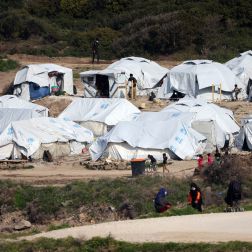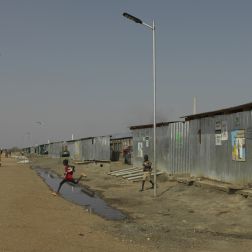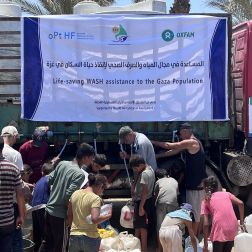- 6 mins read time
- Published: 19th March 2020
It’s five years since war broke out in Yemen. I will never forget the terror in the eyes of my children.
Written by Manal, a humanitarian worker with Oxfam in Yemen.
When war first escalated in 2015, I was living happily with my family in Taiz city. It saddens me how the city I loved, the city that holds all my memories since I was a child turned into a ghost town full of death and fear overnight.
It all started with a blue spark that lit up the sky and invaded our houses and the rooms in which we silently hid. Then we heard the crack. That was the first missile to hit a building near us. After that, bombs fell everywhere; we thought we’d be next. We tried not to panic but panic was all we could feel.
The next day myself and my children went to say goodbye to a friend who was taking a trip abroad. We could hear tanks in the streets nearby and the roads were blocked. We got trapped in her house, separated from our families who kept calling to check if we were okay. I will never forget the terror in the eyes of my children.
We were trapped inside the house for three days. I remember the heavy sounds of gun fire and tanks screeching just a few kilometres away. There was no one else with us so we managed to survive with the limited food we had.
“I still remember the fear, oppression and humiliation that day brought. I cried so hard, I cried and cried, all the way back. I was terrified.”
This day was sadly just a sign of what was to come – the feelings of fear, paralysis and vulnerability. Five years later, that feeling of being trapped is one that I and other Yemeni women constantly feel. But what I and others strive to do is fight that feeling and do all that we can to lead, to help others, and to feel hope that this conflict will end, and our lives can return to normal.
At one stage, everything calmed down and people started to feel safe. That was until six missiles hit a nearby mosque destroying it completely. Most of the injured were women and children. While a close relative of mine was helping to rescue the injured, another airstrike took his life. We didn’t even have time to mourn him properly.
We were just one family out of millions forced from our homes and all that home means – family, memories, security, history, love. As Yemenis, we have been forced to live in schools, tents, mosques or with other friends and relatives. The risk of experiencing violence, instability and illness has increased. We are all farther from our support networks and are forced to walk long distances for things like water, food or other resources. A life of displacement feels tenuous.
On the road to seek refuge, I would often close my eyes, allowing my memories to start play in my mind. I would be back with my family, as we gathered on Fridays at my grandfather’s house to eat lunch and then sing and dance with our neighbours until midnight.
I would remember how peaceful life was and how my friends and I had dreamed of the future. We loved adventure. We sometimes camped in nearby villages and mountains, enjoying nature together while sharing our hopes and memories.
All of that seems like a dream now. We still hope to go back home one day, where we belong and where our memories reside. It’s ironic how a single terrible memory of a blue glowing light can bring an end to warm memories.

I now live with my mother, sister and two brothers. My father passed away over 15 years ago. I am the oldest and the only provider for my family. I love them and I try to take care of their needs the best I can. They are my only support in this world and to them I am the same.
As an Oxfam worker, it brings joy to my heart when I see how the aid that we provide helps people smile and brings them hope at a time of displacement and vulnerability.
I have seen a lot during these five years of war, particularly how hard it is for women to survive these circumstances. Many women have become the sole caregivers and breadwinners – a huge burden to bear.
Job opportunities are scarcer and prices have soared, while suffocating social restrictions on women remain. When you are a woman in a country like Yemen, war becomes more difficult with each passing day. The struggle to survive gets harder, especially for the many women who have been forced to depend on men all their lives without proper education or skills to fall back on.
I am sharing my story as one of countless women who deserve more than just recognition. Women across Yemen are rising every day, doing all they can in difficult conditions to protect their families and their communities. With an education and a good job that fills me with pride, I am one of the lucky ones. Worst-case scenarios for women and girls in Yemen after five years of war includes surviving sexual violence, malnutrition, abuse, early marriage and sometimes death.

The women of Yemen had no hand in this war. All decisions were and are still taken by men. Violence is being perpetrated by men. Women have the strength to act together – to step out of the crowded rooms where we feel vulnerable and paralysed, to lead our families, communities and country. For the days ahead, I call on women to have an equal voice in ending this war and paving the way for a peaceful future for Yemen.
Since the beginning of the conflict in 2015, Oxfam teams have reached more than 3 million people with much-needed sanitation services, clean water, cash assistance and food vouchers. Even as COVID-19 sweeps across the globe, our staff continues to deliver aid, comfort and hope to the people of Yemen. But we need all the help we can get.
Please give what you can today.




